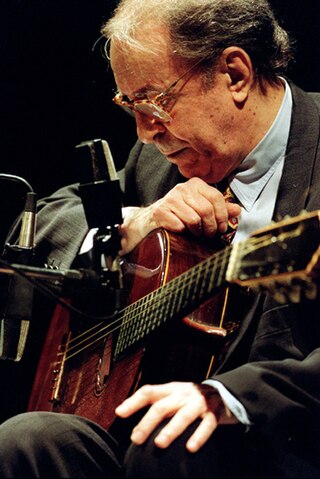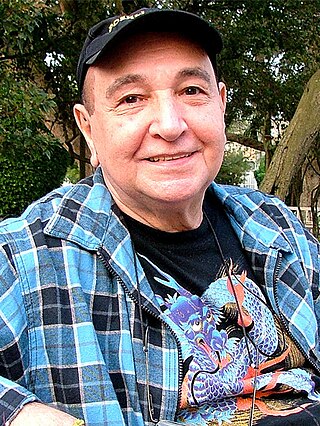Related Research Articles
Bossa nova is a relaxed style of samba developed in the late 1950s and early 1960s in Rio de Janeiro, Brazil. It is mainly characterized by a "different beat" that altered the harmonies with the introduction of unconventional chords and an innovative syncopation of traditional samba from a single rhythmic division. The "bossa nova beat" is characteristic of a samba style and not of an autonomous genre. The bossa nova wave became popular around the world; this increased popularity helped to renew samba and contributed to the modernization of Brazilian music in general.

Antônio Carlos Brasileiro de Almeida Jobim, also known as Tom Jobim, was a Brazilian composer, pianist, guitarist, songwriter, arranger, and singer. Considered as one of the great exponents of Brazilian music, Jobim merged Samba with Cool jazz in the 1960s to create Bossa nova, with worldwide success. As a result, he is widely regarded as the "father of bossa nova".

João Gilberto was a Brazilian guitarist, singer, and composer who was a pioneer of the musical genre of bossa nova in the late 1950s. Around the world, he was often called the "father of bossa nova"; in his native Brazil, he was referred to as "O Mito" . In 1965, the album Getz/Gilberto was the first jazz record to win the Grammy Award for Album of the Year. It also won Best Jazz Instrumental Album – Individual or Group and Best Engineered Album, Non-Classical. Nominated at the Grammy 1978 in the category Best Jazz Vocal Performance, album Amoroso, and winner category in Grammy 2001 with João voz e violão Best World Music Album.

Getz/Gilberto is an album by American saxophonist Stan Getz and Brazilian guitarist João Gilberto, featuring pianist and composer Antônio Carlos Jobim, who also composed many of the tracks. It was released in March 1964 by Verve Records. The album features the vocals of Astrud Gilberto on two tracks, "Garota de Ipanema" and "Corcovado". The artwork was done by artist Olga Albizu. Getz/Gilberto is a jazz and bossa nova album and includes tracks such as "Desafinado", "Corcovado", and "Garota de Ipanema". The last received a Grammy Award for Record of the Year and started Astrud Gilberto's career. "Doralice" and "Para Machucar Meu Coração" strengthened Gilberto's and Jobim's respect for the tradition of pre-bossa nova samba.

Luiz Floriano Bonfá was a Brazilian guitarist and composer. He was best known for the music he composed for the film Black Orpheus.

Jazz Samba is a bossa nova album by Stan Getz and Charlie Byrd released by Verve Records in 1962. Jazz Samba signaled the beginning of the bossa nova craze in America. Stan Getz was the featured soloist and the tracks were arranged by Charlie Byrd, who had first heard bossa nova during a tour of Brazil in 1961.

The Composer of Desafinado, Plays is the first album by Antônio Carlos Jobim. Released in 1963, the album features a dozen instrumentals arranged by Claus Ogerman, whose work would mark the beginning of a lifelong musical relationship with Jobim. Of these twelve songs, nearly all of them are jazz standards. The opening track "The Girl from Ipanema" is believed to be the second most recorded song in history behind The Beatles' "Yesterday," and a recording of the song by Astrud Gilberto and Stan Getz became a worldwide hit in 1964.

João Donato de Oliveira Neto was a Brazilian jazz and bossa nova pianist as well as a trombonist from Rio Branco. He first worked with Altamiro Carrilho and went on to perform with Antonio Carlos Jobim and Astrud Gilberto. Because of the area he grew up in Brasil he was able to hear Cuban music on the radio. This influence would manifest itself in many of his compositions, piano, and trombone playing. Donato's most well-known compositions include: "Amazonas", "Lugar Comum", "Simples Carinho", "Até Quem Sabe" and "Nasci Para Bailar".
"Samba de uma Nota Só", known in English as "One Note Samba", is a bossa nova and jazz standard song composed by Antônio Carlos Jobim with Portuguese lyrics by Newton Mendonça. The English lyrics were written by Jon Hendricks. It was first recorded by João Gilberto in 1960 for his album O Amor, o Sorriso e a Flor.
"Água de Beber" is a bossa nova jazz standard composed by Antônio Carlos Jobim and originally recorded in the key of A minor, with lyrics written by Vinícius de Moraes. The English lyrics were written by Norman Gimbel.
"Dindi" is a song composed by Antônio Carlos Jobim, with lyrics by Aloysio de Oliveira. It is a world-famous bossa nova and jazz standard song. Jobim wrote this piece especially for the Brazilian singer Sylvia Telles. "Dindi" is a reference to a farm named "Dirindi", in Brazil, a place that Jobim and his friend/collaborator Vinicius de Moraes used to visit. In December 1966, Telles recorded this piece with the guitarist Rosinha de Valença.

Big Band Bossa Nova is a 1962 album by saxophonist Stan Getz with the Gary McFarland Orchestra. The album was arranged and conducted by Gary McFarland and produced by Creed Taylor for Verve Records. This was Getz's second bossa nova album for Verve following Jazz Samba, his very successful collaboration with guitarist Charlie Byrd.
This is a list of published recordings of Antônio Carlos Jobim.
"Once I Loved" is a bossa nova and jazz standard song composed in 1960 by Antônio Carlos Jobim, with lyrics by Vinícius de Moraes. Words in English were later added by Ray Gilbert. In a few early cases, the song was also known as, a translation into English of the original Portuguese title.
"Samba do Avião", also known as "Song of the Jet", is a Brazilian song composed in 1962 by Antônio Carlos Jobim, who also wrote the original Portuguese lyrics. The English-language lyrics are by Gene Lees.
"Ela é Carioca" is a bossa nova song composed in 1963 by Antônio Carlos Jobim, with Portuguese lyrics by Vinícius de Moraes. English lyrics were written by Ray Gilbert. The song is sometimes titled "Ele é Carioca ."

Copacabana Palace is an Italian comedy film from 1962, directed by Steno, written by Luciano Vincenzoni, starring Walter Chiari, Mylène Demongeot and Franco Fabrizi.
"A felicidade" ("Happiness") is a bossa nova song by Antônio Carlos Jobim, with lyrics by Vinícius de Moraes, composed in 1958 for the French film Orfeu Negro.
"Vivo Sonhando" is a bossa nova song from 1962 with words and music by Antônio Carlos Jobim. English lyrics were added later by Gene Lees.
"O Morro Não Tem Vez", also known as "Favela", "O Morro", and "Somewhere in the Hills", is a bossa nova jazz standard composed by Antônio Carlos Jobim with lyrics written by Vinicius de Moraes. The English lyrics were written by Ray Gilbert.
References
- 1 2 Castro, Ruy, Bossa nova: the story of the Brazilian music that seduced the world, A Cappella Books, Chicago, IL, 2000. ISBN 9781556524097
- ↑ IMDB – Copacabana Palace (1962)
- ↑ SecondHandSongs - Só Danço Samba
- ↑ "So Danco Samba, by Martini Kings".